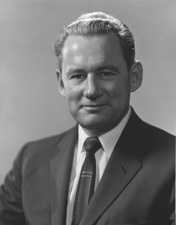Clair Engle
| Clair Engle | |
|---|---|
 | |
| United States Senator from California | |
| In office January 3, 1959 – July 30, 1964 | |
| Preceded by | William F. Knowland |
| Succeeded by | Pierre Salinger |
| Member of the U.S. House of Representatives from California's 2nd district | |
| In office August 31, 1943 – January 3, 1959 | |
| Preceded by | Harry L. Englebright |
| Succeeded by | Harold T. Johnson |
| Personal details | |
| Born | September 21, 1911 Bakersfield, California |
| Died | July 30, 1964 (aged 52) Washington, D.C., United States |
| Resting place | Oak Hill Cemetery, Red Bluff, California |
| Nationality | American |
| Political party | Democrat |
| Alma mater | California State University-Chico University of California Hastings College of Law |
Clair Engle (September 21, 1911 – July 30, 1964) was an American politician of the Democratic Party and a United States Senator from California.
Early years
Engle was born in Bakersfield. He attended public school in Red Bluff and graduated from Chico State Teachers College in 1930, and from the University of California Hastings College of the Law in 1933.
Admitted to the bar in 1933, Engle commenced practice in Corning, and served as District Attorney of Tehama County from 1934 until 1942, when he was elected to the California Senate, serving in that body until 1943.
Member of the U.S. Congress and Senate
On August 31, 1943, Engle was elected as a Democrat to represent California's 2nd congressional district in the 78th Congress to fill the vacancy caused by the death of Harry L. Englebright. He was elected to a full term in 1944 and was reelected to the following six Congresses, serving until January 3, 1959. While in the United States House of Representatives he was Chairman of the U.S. House Committee on War Claims for the 79th Congress and Chairman of the U.S. House Committee on Interior and Insular Affairs for the 84th Congress and the 85th Congress.
Engle was elected as a Democrat to the United States Senate in 1958 and began his service there January 3, 1959. However, on August 24, 1963, he underwent surgery to remove a brain tumor, which left him partially paralyzed, forcing him to miss several Senate sessions.
On April 13, 1964, the gravity of Engle's health problems were clearly evident as he attempted to introduce a resolution calling for a delay in the construction of an atomic power plant near San Francisco. He was given permission, but was unable to speak, forcing a colleague to present the resolution instead.
Engle officially ended his re-election campaign on April 28, 1964, just four days after undergoing his second brain operation in eight months. However, he chose not to endorse either of the remaining Democratic challengers, California State Controller Alan Cranston and former Presidential press secretary Pierre Salinger. That decision came as a result of the state Democratic leaders refusing to endorse him unless he provided details concerning his health.
Final days
On June 10, 1964, during the roll call for the historic, successful effort to break the filibuster on what would become the Civil Rights Act of 1964, when the clerk reached "Mr. Engle," there was no reply. The tumor had robbed Engle of his ability to speak. Slowly lifting an arm, he pointed to his eye, thereby signaling his affirmative vote ("aye").[1] The cloture vote was 71-29, four votes more than the two-thirds required to cut off the filibuster.[2] Nine days later the Senate approved the Act itself.
Engle died in Washington, D.C. a month and a half later, aged 52.
Trinity Lake, in California's Trinity County, was renamed for Clair Engle, although the name Trinity Lake continued to be commonly used, and eventually the lake's original name was restored.
See also
- List of notable brain tumor patients
References
- ↑ The NewsHour, Democratic Senator Johnson in Critical Condition, Dec. 14, 2006. Retrieved Dec. 29, 2006.
- ↑ Associated Press account of June 10, 1964, as reported in 'The Oakland Tribune'
External links
- California State University, Chico, Clair Engle Collection, MSS 177, Special Collections, Meriam Library, California State University, Chico.
- University of California, Davis, Department of Animal Science, Memorial Book Listing Clair Engle's legislative accomplishments
| United States House of Representatives | ||
|---|---|---|
| Preceded by Harry Lane Englebright |
Member of the U.S. House of Representatives from California's 2nd congressional district 1943-1959 |
Succeeded by Harold T. Johnson |
| United States Senate | ||
| Preceded by William F. Knowland |
U.S. Senator (Class 1) from California 1959 – 1964 Served alongside: Thomas Kuchel |
Succeeded by Pierre Salinger |
| Party political offices | ||
| Preceded by Will Rogers, Jr. |
Democratic nominee for Senator from California (Class 1) 1958 |
Succeeded by Pierre Salinger |
| ||||||||||
|
